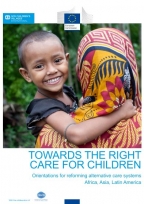Professionalizing the Workforce Supporting Infants and Toddlers from Birth to Three

There is mounting evidence on the positive link between high quality early childhood development (ECD) personnel and the physical, social, and cognitive development of young children. Despite this growing body of knowledge, the early childhood workforce continues to face challenges such as inadequate training, low remuneration, and a lack of professional recognition. Moreover, a lack of documentation on promising approaches to address these workforce challenges limits opportunities to learn from the implementation experiences of different countries around the world.
To bring light to these challenges, and potential responses to them, the Early Childhood Workforce Initiative (ECWI) has developed 6 country briefs which highlight efforts to support the workforce across different geographies and services.
These country briefs were informed by desk reviews and information collected through key informant interviews (KII) with country experts from implementing NGOs, multilaterals, and research institutions, as well as program managers and government officials across 15 countries. After identifying six promising country approaches to highlight, we conducted further desk research and interviews to inform the country briefs. These interviews were particularly helpful for clarifying the key enablers and barriers to implementation in each country as well as the policy lessons for other countries.
The first of these briefs focuses on Ecuador. Professionalizing the Workforce Supporting Infants and Toddlers from Birth to Three highlights the government of Ecuador’s approach to professionalizing childcare center and home visiting workers with pre- and in-service training that emphasizes theoretical knowledge and practical skills.
Authors: Year of Publication:2019


